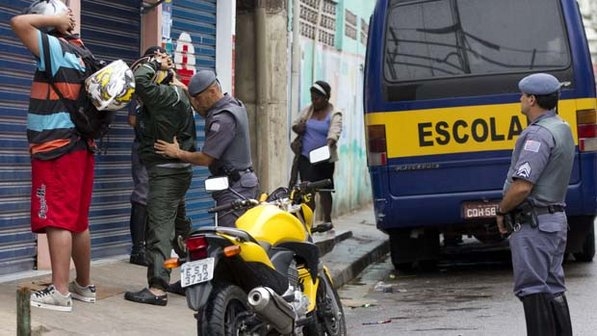As murders spike in São Paulo and police face off with the powerful prison gang known as the PCC, there are signs that that the unrest might have spread south to the state of Santa Catarina.
Seven people were killed in the city of São Paulo in the night of November 14 and the early hours of November 15. Some 14 others were wounded in shooting incidents, including three police officers, one of whom was attacked by gunmen on a motorbike, as Ultimo Segundo reported.
These incidents are part of a surge in killings in São Paulo this year which has heightened in recent weeks, with over 200 murders since October — more than 30 of them over the weekend. Twenty people were killed in a single 24-hour period the previous weekend, making it the bloodiest in several years. At the center of this violence are the police, both as perpetrators and victims, with 95 officers killed so far in 2012.
InSight Crime Analysis
The violence has been attributed to a new rash of revenge killings between the police and members of the First Capital Command (PCC), a prison gang that controls much of the city’s drug trade. São Paulo had been relatively peaceful since the last outbreak of violence between the police and the gang ended in May 2006. It broke out after jailed leaders were transferred to a prison hundreds of kilometers outside of São Paulo, and members of the PCC killed more than 40 security officials in a series of coordinated attacks in prisons and on the streets of São Paulo, as well as other cities across Brazil.
The PCC leaders, most of whom are in prison, ordered an end to the violence after talks with representatives of the state government in May 2006, as various media reported at the time, though the government denied that any concessions had been made. The leaders bargained for better conditions for those who had been moved to the more remote prison, and sought conjugal visits and access to televisions, according to Folha. The government admitted that the PCC had offered a truce, but said that it had been unilateral and that no deal had been made.
Now it appears that the truce has been broken. The past several months saw a spate of killings on both sides, with the murder of dozens of officers and attacks on police stations. Police killed a string of suspects, reporting that they had died while resisting arrest. InSight Crime noted in July that there were “signs that the cycle of police abuse and retaliation [was] beginning to heat up.”
Security expert and former drug czar Walter Maierovitch told the Associated Press that the violence was caused by the government breaking its informal truce with the PCC, and acting more aggressively against the group. “The violence we’re seeing now is the PCC’s response to the end of the truce and the violent reaction of police who don’t hesitate to execute real and imagined suspects out of a feeling of revenge.”
There are signs that the violence could be spreading to other parts of Brazil. In the state of Santa Catarina, south of São Paulo, there have been outbreaks of unrest in recent days, with buses burned, shots fired at police stations, and dozens of people arrested. The state public security secretary Cesar Augusto Grubba said that authorities were investigating whether it was linked to the disturbances in São Paulo. However, another prominent police officer, Renato Hendges, who heads the local Association of Police Chiefs, said that the unrest had no connection to São Paulo, as Diario do Grande ABC reported. “Here, it is a reaction to the treatment within prisons. They decided to carry out a rebellion on the outside. It doesn’t have anything to do with the PCC,” he said.
The theory that the incidents are connected is supported, however, by recent report from ISTOE magazine, which found that the PCC was working to expand its influence beyond São Paulo. It cited legal documents which said that a local group linked to the PCC had been created at least seven years ago, known as the PGC – First Catarina Command. The report also referred to the case of a leader of a group of Santa Catarina-based ATM robbers who had received training from PCC members.
In São Paulo, authorities have announced plans to transfer other imprisoned PCC members from São Paulo state prisons to federal facilities to try to break the links between jailed leaders and gang members on the outside. This could cause the levels of violence to rise further, which may lead officials to consider a new truce. Whether they will admit it if they do is another question altogether.

